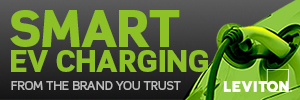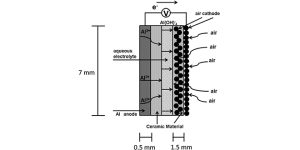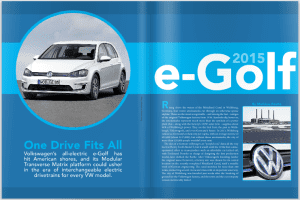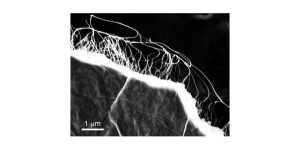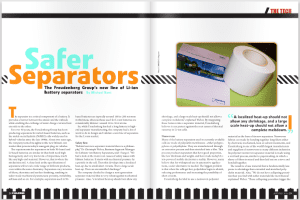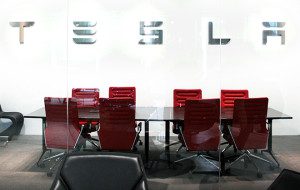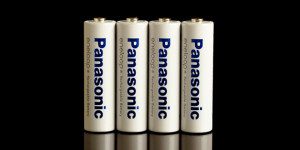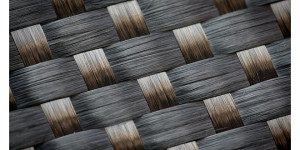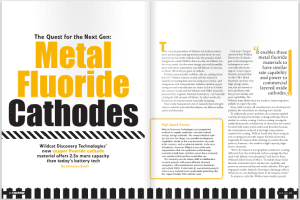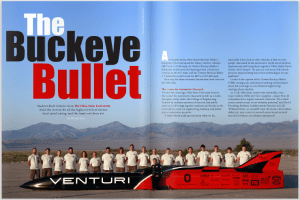Metal-air battery technology could offer very high energy density, and is considered a promising candidate for “beyond Li-ion” next-generation batteries. Aluminum, which is abundant and cheap, is a likely anode material. Aluminum-air batteries have a theoretical specific energy of up to 8.1 kWh/kg, second only to lithium-air batteries (13.0 kWh/kg). A pioneer in the aluminum-air… Read more »
Search Results Found For: "lithium metal batteries"
2015 VW e-Golf ushers in an era of interchangeable drivetrains for every Volkswagen model
Rising above the waters of the Mittelland Canal in Wolfsburg, Germany, four iconic smokestacks cut through an otherwise sparse skyline. These are the most recognizable – and among the last – vestiges of the original Volkswagen factory from 1938. Symbolically, however, the smokestacks represent much more than the symbols of a power plant that –… Read more »
Thin-film supercapacitors could be embedded in body panels
Researchers around the world are working on supercapacitors (aka ultracaps), whose high power density makes them a perfect complement for lithium-ion batteries. Meanwhile, a couple of visionaries at Volvo have been thinking about ways to get around the high space requirements of batteries by storing energy in a car’s body panels. Image Courtesy of Volvo… Read more »
New joint venture will produce Li-ion cathode active materials
Chemicals giant BASF and metal oxide specialist Toda Kogyo have agreed to form a joint venture for Li-ion cathode active materials (CAM). The firms will combine their respective CAM businesses, intellectual property and production assets in Japan. The new venture, BASF Toda Battery Materials, will produce a broad range of cathode materials, including Nickel Cobalt… Read more »
Freudenberg Group’s new line of Li-ion battery separators
The separator is a critical component of a battery. It provides a barrier between the anode and the cathode while enabling the exchange of ionic charge carriers from one side to the other. For over 40 years, the Freudenberg Group has been producing separators for nickel-based batteries, such as the nickel-metal hydride (NiMH) cells widely… Read more »
New book excerpt: The early days of Tesla
This article is an excerpt from Tesla Motors: How Elon Musk and Company Made Electric Cars Cool, and Sparked the Next Tech Revolution by Charged Senior Editor Charles Morris. This 270-page book is a comprehensive history of Tesla, told by the entrepreneurs who made it happen, as well as an assessment of the company’s lasting influence… Read more »
Automotive segment consumes 10.5% of global advanced battery production
Batteries are big business. According to the latest Advanced Battery Tracker from Navigant Research, more than 6 billion advanced battery cells were sold in 2013, representing 40 gigawatts of power capacity and more than $13.4 billion in sales (a modest increase over 2012’s $12.8 billion). The majority of these batteries were manufactured in China. Most… Read more »
Swedish researchers: Carbon fiber can serve as both body panel and battery
It’s one of the dilemmas of EV design: It’s imperative to keep a vehicle’s weight as low as possible, but the most critical component – the battery – is necessarily quite heavy (and bulky). A little outside-the-box thinking yields an elegant solution – make the box the battery. In other words, design a battery material… Read more »
Wildcat’s new copper fluoride cathode material offers 2.5x more capacity than today’s battery tech
The current generation of lithium-ion battery materials is quickly approaching its theoretical limit. In commercial layered oxide cathodes, like the popular nickel-manganese-cobalt (NMC), there is only one lithium ion for every metal. So, the most energy you could possibly store with those materials is one full lithium in and out, or about 300 mAh per… Read more »
The Buckeye Bullet: A student-built EV that’s racing towards 400 mph
As it stands today, Ohio State’s Buckeye Bullet 1 holds the US record speed for battery electric vehicles (BEVs) at 314.958 mph, its Venturi Buckeye Bullet 2 holds the world record for hydrogen fuel cell electric vehicles at 302.877 mph, and the Venturi Buckeye Bullet 2.5 holds the world record for BEVs at 307.666 mph. … Read more »



